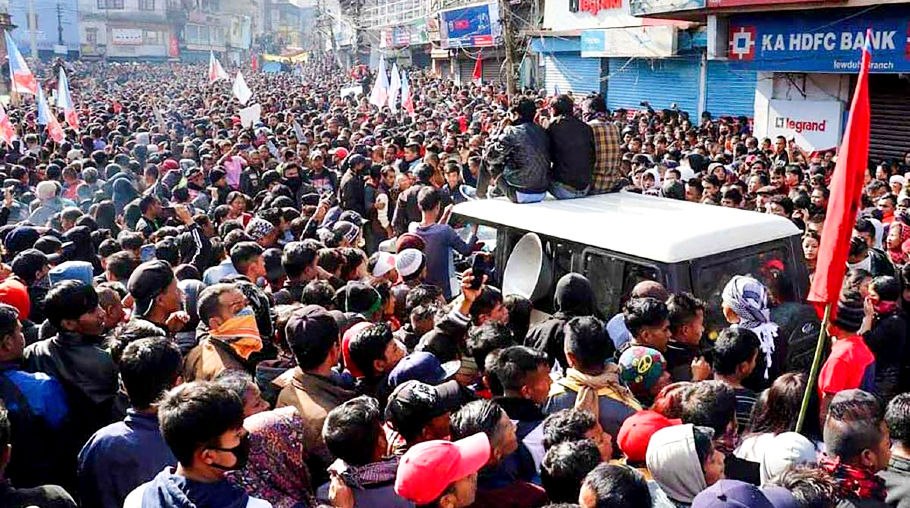
Tribals on warpath as SC quashes quota in AP, Telangana teaching jobs

The COVID-19 lockdown has not deterred the tribal communities from hitting the streets. The tribal rights organisations across the two Telugu states of Andhra Pradesh (AP) and Telangana are on a warpath, protesting against a recent Supreme Court (SC) judgment, quashing the 100 per cent reservation for Scheduled Tribe candidates for teachers’ posts in schools located in the notified scheduled areas.
The Apex Court had ruled that 100 per cent reservation for local tribal communities was “unconstitutional, unfair and discriminatory”, not just against the open category candidates but also against Scheduled Castes and Other Backward Classes (OBCs).“There is no rhyme or reason for the State Government to resort to 100 per cent reservation. Such an action defies logic. Merit cannot be denied in toto by providing reservations,” a five-judge constitution bench said while quashing an order issued by the combined Andhra Pradesh in tune with the special rights provided for adivasis under Fifth Schedule of the constitution.
The Supreme Court’s judgement has started a debate over how the interests of the tribal communities, protected under the Fifth Schedule, come in conflict with that of the other categories within the quota system. The Apex Court has cited the Indra Sawhney vs Union of India judgement, which capped reservations at 50 per cent.
The issue has reached the top court, after an appeal was filed against the Andhra Pradesh high court ruling, which had upheld the government order providing for 100 per cent reservation for tribal teachers in the scheduled areas. The petitioner contended that the 100 per cent quota was discriminatory as it not only affected the open category candidates but also the other reserved categories.
“The reservation in this case violated Articles 14 (equality before law), 15(1) (discrimination against citizens) and 16 (equal opportunity) of the Constitution,” the apex court concluded.“The rights of the Scheduled Tribes who are not residents of the scheduled areas shall also be adversely affected if the impugned order is allowed to become operational,” the constitution bench said.
The court agreed not to quash the appointments to the posts made since 1986 on the condition that Andhra Pradesh and Telangana states would not attempt to bring in a similar quota in the future.
Tribal rights
The tribal advocacy groups contend that social justice cannot be delivered, if tribals in the scheduled areas and the other marginalised sections living elsewhere, are seen as being on the same page.
“The SC ruling runs counter to the principal objective of the Fifth Schedule of the Constitution. It was framed to give protection to the tribals living in the scheduled areas from alienation of their lands and natural resources to non-tribals,” tribal activist and senior lawyer P Trinadha Rao said.
The tribal communities in both Telangana and Andhra Pradesh were already suffering as their lands and jobs were being snatched away by influential non-tribals through blatant violation of the Land Transfer Regulation Act, said M Babu Rao, a tribal leader of the CPI (M) and a former MP representing the Bhadhrachalam constituency in Telangana.
The Human Rights Forum (HRF) said that the SC judgment diluted the special status accorded to Scheduled Tribes living in Fifth Schedule areas. “The rationale for absolute reservation was that non-tribals with no empathy towards tribals could not be expected to work dedicatedly for their welfare,” the HRF said in a statement.
Long struggle
“After a prolonged struggle, we had achieved 100 per cent reservation for local tribals in the education sector. We will not allow it to be snatched away,” asserted T Ramakrishna, a spokesman of AP Girijana Sangam. In January 2000, the Governor of the combined Andhra Pradesh had issued an order, directed that all teaching posts in schools located in scheduled areas will be filled by local ST candidates alone, of whom 33 per cent must be women.
The government order said the reservation was “to promote educational development of tribals, to solve the phenomenal absenteeism of teachers in the schools situated in scheduled areas with a view to protect the interests of local tribals”.
A similar order, passed in 1986, was quashed by the Andhra Pradesh Administrative Tribunal in 1989. The state government later withdrew an appeal filed in the SC challenging the tribunal’s decision, but passed a similar order again in 2000, which was later upheld by a High Court bench in 2001.
“We are not against non-tribals. We are only asking for our constitutional right as per the Fifth Schedule. The reservation over the past several years has proven beneficial for education and employment among STs in Scheduled areas,” said A Narasaiah, secretary of AP Girijana Sangham.
RELATED NEWS: States not bound to give quotas for SCs/STs/OBCs, rules SC
The CPI (M) and civil society groups have appealed to the governments of AP and Telangana to file a review petition in the Supreme Court. “Because of the lockdown, we are unable to gather outside, or communicate the issue to public representatives properly,” Narasaiah said and demanded that the governments pass an immediate ordinance to allow the 100 per cent reservation to continue.
Violent history
The tribal-dominated villages had witnessed violent clashes in the past between local tribals and non-tribals who were allowed by the successive governments to live in these villages and carry out their businesses.
There is a specific law in Andhra for protection of tribal rights in the scheduled areas. It is called the Land Transfer Regulation Act 1 of 1970, popularly known as 1/70 Act. The Act checks the transfer of tribal lands to non-tribals.
There are widespread allegations of gross violations of the Act with regard to allotting mining leases in the scheduled areas to non-tribals and allowing non-tribal to own benami houses, lodges, and hotels.


